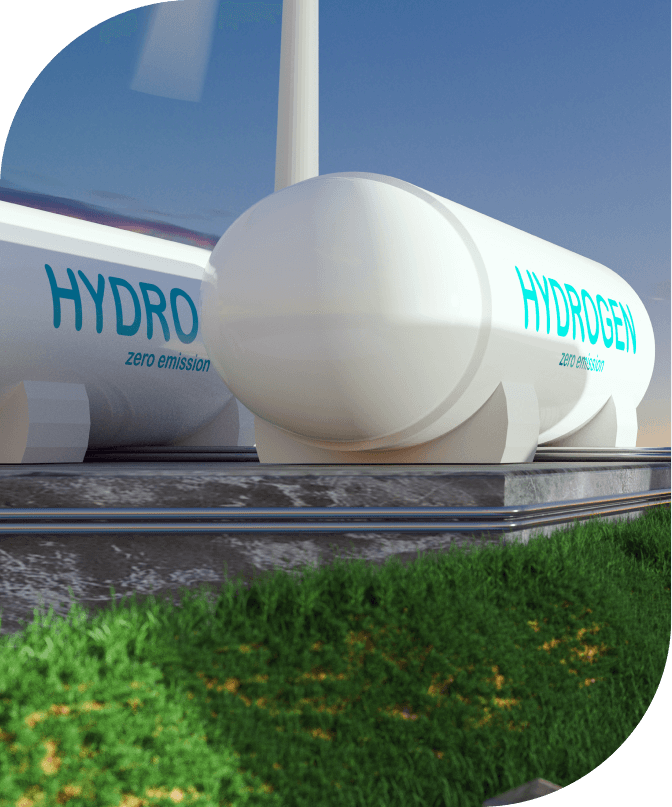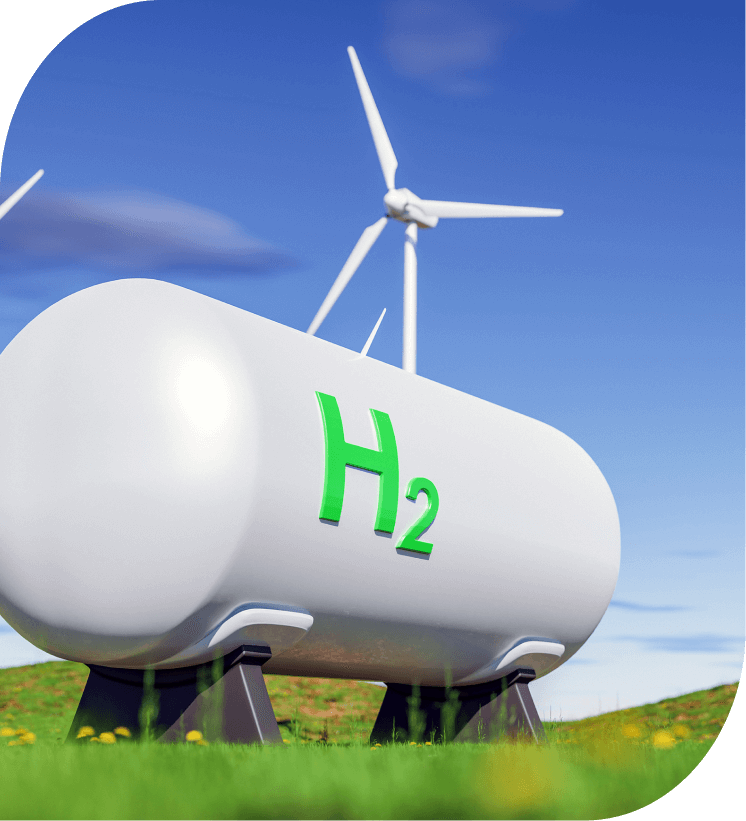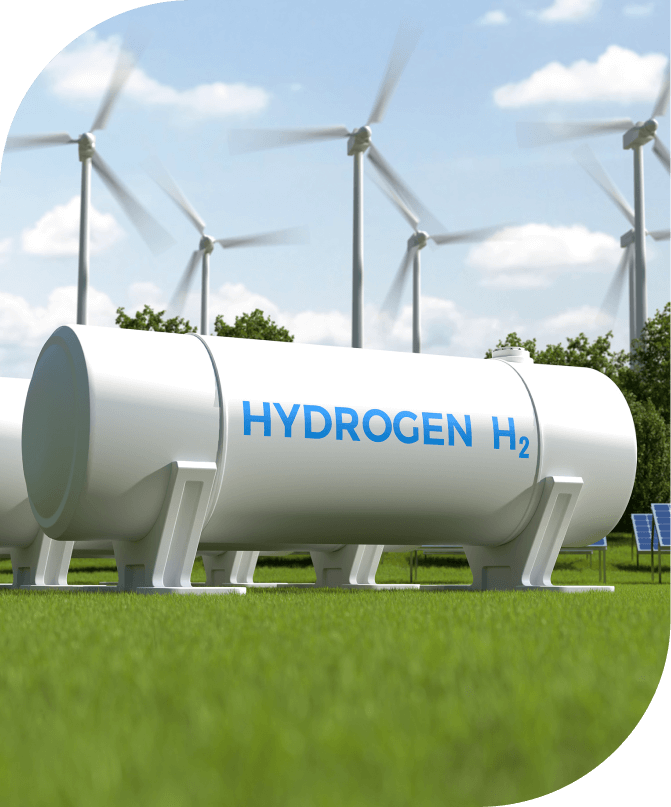Green Fuels
Powering India’s Clean Energy Transition
Green Fuels are chemical products derived from Green Hydrogen (Hydrogen produced by electrolysis of water). Commonly known Green fuels include Green Ammonia, Green Methanol and Sustainable Aviation Fuel.


Benefits of Green Fuels
Zero Carbon Emission
Green Fuels are produced using renewable energy sources like wind energy or solar power system , which results in no direct greenhouse gas emissions during the production process. This makes it a clean and sustainable energy carrier, particularly suitable for decarbonizing sectors that are hard to electrify, such as heavy industry and long-haul transportation.
Storage
Green fuels are easy to store, which allows them to be used subsequently for other purposes and at times other than immediately after their production.
Helps achieve climate goals
Green fuels offer a zero-emission alternative to fossil fuels. Deploying it can make a significant contribution to countries’ climate targets.
Green Steel Production
Green fuels can be used to make steel instead of carbon-intensive coke, which lowers emissions and results in more environmentally friendly steel.
Fuel for Zero-Emission Shipping
Green fuels and its derivatives can be used to power fuel cells in ships, helping the maritime industry transition to carbon-neutral transportation.
Why Avaada is your ultimate choice for Harnessing Green Fuels Power?

Our solutions empower organizations to revolutionize their energy strategies in alignment with their net-zero goals. At Avaada, we are dedicated to ushering in a more sustainable future through global decarbonization of power generation and widespread green fuel production. Our versatile platforms offer comprehensive support to businesses and communities, encompassing power generation, hydrogen production, and energy storage solutions.
Avaada is convinced in its belief in the potential of green fuels as a low-carbon energy carrier, and we are committed to funding large-scale green fuel production projects that leave a lasting positive impact on the economy and society while delivering substantial returns on investment.
In our pursuit of achieving Net Zero by 2050, we recognize that the world requires not only electron-based power but also power derived from molecules. Green fuel production, in turn, emerges as the clean energy vector poised to replace carbon-intensive energy sources in challenging sectors. It stands as the ideal energy feedstock for industrial processes, heavy mobility applications, and it serves as an efficient medium for transporting sustainable energy solutions across time and space.
We proudly stand as a frontrunner in funding sustainable green fuel energy production across the globe. Low cost and quality.
“Our mission is to deliver practical remedies to address the intricate global challenges associated with green fuel.” Mr. Vineet Mittal, Chairperson, Avaada.
Industry and heavy transport sectors account for a significant one-third of global carbon emissions. While the scientific knowledge for generating green fuel and sustainable fuels to address these emissions exists, our challenge lies in:
- Integrating and expanding these solutions effectively.
- Ensuring their cost-competitiveness.
- Orchestrating seamless compatibility with intermittent renewable energy sources.
The Path to Green Fuels Excellence
In a world that is increasingly recognizing the urgent need for sustainable energy alternatives, Avaada’s progress in green fuel production is a beacon of hope and a testament to the transformative power of renewable energy solutions.
In a remarkable stride toward “Sand-to-Molecule” idealogy, Avaada Group has achieved a historic milestone in the field of green fuel production. With the successful closure of a monumental $1.3 billion funding round, Avaada has firmly established itself as a trailblazer in the green energy sector, not just in Asia but on a global scale, and paved its way to becoming the leading Green fuel Company in Asia.
The group has embarked on a strategic partnership, cemented through a Memorandum of Understanding (MoU) with Tata Steel SEZ Ltd, marking a significant leap towards the establishment of a state-of-the-art Green Fuel plant and Green Ammonia Manufacturing Unit in Gopalpur Industrial Park, Odisha. This venture aligns seamlessly with Avaada’s unwavering commitment to spearheading the Green Fuel energy revolution that is poised to reshape the future of energy production. The initiative will create an estimated 1,600 direct jobs and 4,000 indirect employment opportunities. Beyond its economic significance, this project is set to make a substantial environmental contribution, reducing annual carbon dioxide emissions by nearly two million tons.
As we look ahead, the horizon appears infinitely brighter and greener, with Avaada leading the charge in the ongoing green fuel production revolution. Our dedication to innovation and sustainable solutions reinforces their role as catalysts of change in the global pursuit of a cleaner, more environmentally conscious tomorrow.




The What and Why’s of Green Fuels?
Green Fuels are largely derived from Green Hydrogen which include Green Ammonia, Green Methanol and Sustainable Aviation Fuel. Green Fuels stands as a pivotal tool in accelerating our journey towards a carbon-neutral future. It will facilitate the advancement of green mobility, the decarbonization of various large-scale industrial applications (such as fertilizers, refineries, chemicals, steel), and the integration of intermittent renewable energies into our energy systems.
Complementing existing green energy sources, hydrogen holds the potential to fulfill and decarbonize numerous applications, positioning itself as the cornerstone of 100% renewable regions.
Hydrogen solutions across the entire value chain
Avaada has positioned itself as a major player in renewable, hydrogen and operates along the entire length of the green fuel value chain – from production of renewable energies to end uses:
- Energy storage for supplying power during renewable energy downtime.
- Advancing sustainable modes of transportation
- Reducing carbon emissions in industrial applications
Frequently asked questions
Is hydrogen renewable energy?
What is the importance of green fuel Solutions in changing times?
Decarbonizing the planet is one of the goals that countries around the world have set for 2050. To achieve this, green fuel, produced using Electrolyser Manufacture that splits water and hydrogen, plays a pivotal role in addressing climate change by significantly reducing carbon emissions in various sectors, including transportation, industry, and energy production.
By replacing fossil-derived hydrogen, green fuel contributes to the decarbonization of industrial processes like steel and cement manufacturing, reducing their environmental impact. Diversifying energy sources with green fuel reduces dependence on fossil fuels, enhancing energy security and mitigating the risks associated with fluctuating fossil fuel prices and supply disruptions.
It aligns with international goals to reduce carbon emissions and accelerate the transition to clean energy systems, supporting the global energy transition.
How can we speed up the adoption of green fuels?
The cost of green fuel is higher than that of alternatives based on fossil fuels. However, we think that gap may be reduced with the correct legislation and industry action.
How expensive is green fuels?
Making green fuel a successful carbon-neutral substitute for fossil fuels is mostly up to policymakers. To close the existing cost gap, we will require enablers and incentives until the technology is scaled and costs are reduced.
